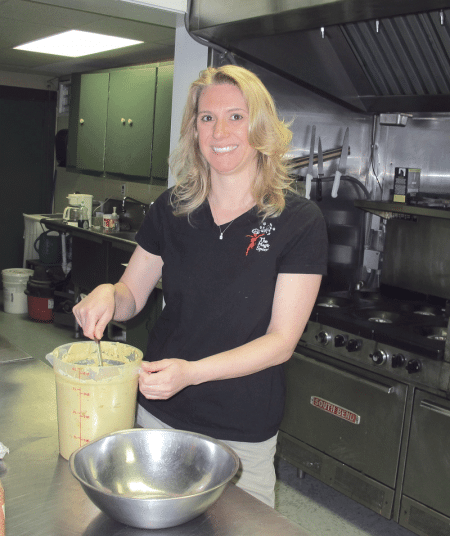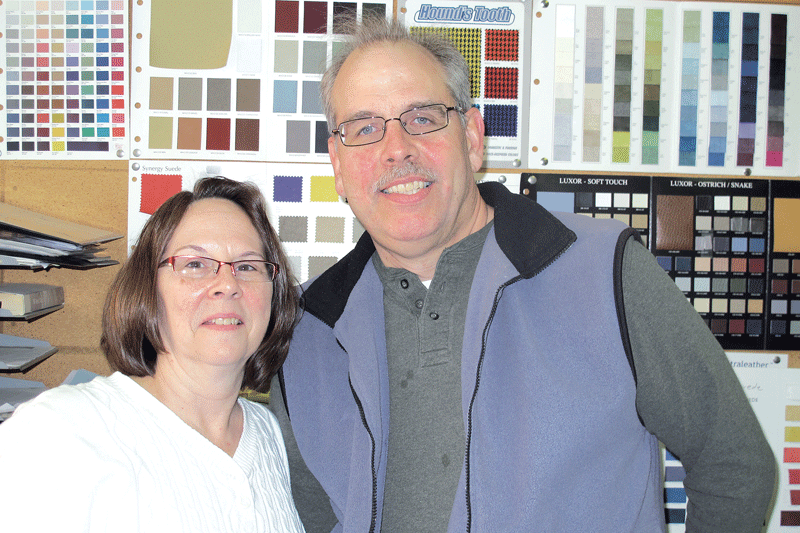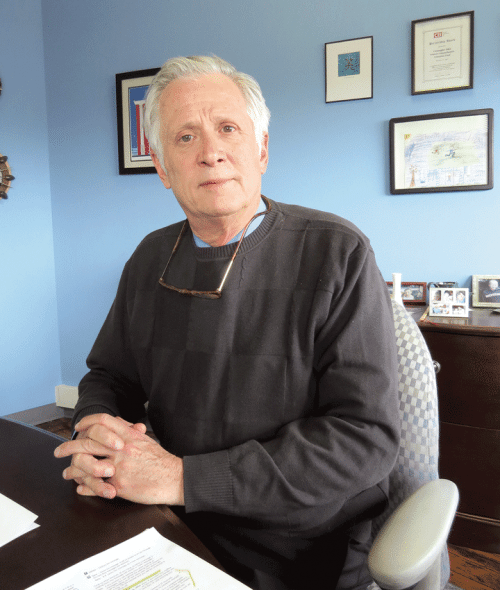
Investments for the Future
Common Capital Program Helps Individuals Fuel Small Businesses
 Beverly Weeks spent close to two decades as a librarian at West Springfield High School, so she understands the importance of researching matters thoroughly.
Beverly Weeks spent close to two decades as a librarian at West Springfield High School, so she understands the importance of researching matters thoroughly.
And that’s exactly what the now-retired Weeks did several months ago when she decided to reel in one of her investments, which she determined was too heavily focused on fossil fuels, and redirect that money toward something far more sustainable — and rewarding.
That research took her to Common Capital’s Community First Fund, which pools investments from people like Weeks and loans them to individuals trying to get a business off the ground or to that proverbial next level.
And that’s where her search ended.
“I was looking around for alternatives — I was searching for investments that would go back into my community, and this struck me as a good one,” she told BusinessWest. “I liked the fact that I would be making a loan that then makes it possible for a venture to get on its feet or add a new aspect or product to its business.

Claudine Baj says loans channeled to her through Common Capital have helped her expand her kitchen and bring in needed help.
Such sentiments are exactly what administrators at Common Capital had in mind a few years ago when they decided to become part of what is now a national trend toward creating community loan pools to assist fledgling businesses.
Chris Sikes, Common Capital’s CEO, said this movement, if it can be called that, can be traced to New Hampshire, and it has quickly spread to many other areas of the country.
That’s because the concept is fairly simple, and — to the growing number of people who, like Weeks, desire investments that that can in some way be categorized as ‘sustainable’ — it’s also quite appealing.
Here’s how it works locally: the Community First Fund will accept donations of any size from $500 to $50,000 (the old floor was $1,000, but it was lowered to enable more people to participate). The loan term is three years with a 2% annual rate of return (better than most currently advertised CD rates certainly), with interest paid to participants semi-annually. Common Capital’s initial goal was to raise $500,000, but that has been passed — approximately $600,000 has ben amassed to date — and the new target is $1 million.
Contributions are pooled and placed in Common Capital’s general fund, where they are loaned to a diverse and growing roster of entrepreneurs who need some capital to make an important step forward, whatever that might be.
People like Claudine Gaj.
She started the Magic Spoon, a catering business, in 1998, and, over the ensuing years, has recorded steady if unspectacular growth. By early last year, she had come to a point most entrepreneurs reach, where she really wanted and needed to bring in help.

Jerry Zalucki, seen here with his wife, Suzanne, says that, when banks wouldn’t listen to his plans for his fledgling business, Common Capital would.
“I went to a Brewing the American Dream event, a meet-and-greet, and I got to meet Jim Koch,” Gaj recalled. “He said, ‘where do you want to be?’ And I said, ‘I really want to hire someone who has skills so I can get out of the kitchen, do more marketing, and be the boss, not the business.’
“He said, ‘what’s stopping you?’ and said, ‘I need to remodel my kitchen,’” she went on, adding that the second loan ($8,500) came through in January. She has, in fact, hired someone, and is “getting there” when it comes to bringing in more business.
Baj is, in many respects, the type of small-business owner that Common Capital assists, said Sikes, adding that the unofficial mission behind the Community First Program is to put more companies like Magic Spoon in the portfolio.
Thus, the program represents the quintessential win, win, win scenario. Donors win because they enter into totally safe investments (loans are secured by Common Capital) with a decent rate of return while spurring economic development and job creation in the region; loan recipients win because they secure financing they probably couldn’t receive from traditional sources; and the region wins because the fund is fueling a recognized surge in entrepreneurial activity.
For this issue, BusinessWest takes an in-depth look at the Community First Fund and the many different ways it can measure success.
The Ride Stuff
Jerry Zalucki was searching for the right words. It’s not that he didn’t know what to say — he certainly did. He just didn’t know how, at least without offending a large group of business professionals.
He was trying to describe the commercial-lending environment in early 2011, just a few years after the Great Recession, and, more specifically, what it was like to be on the other side of the table from those doing the lending — or not.
“Let’s just say … well, let’s just say … it wasn’t a good time to be out there for looking for a loan,” he told BusinessWest, adding that it was his misfortune to be seeking some capital at that time for a venture called Auto Custom Leathers, an offshoot of a larger enterprise that had been sold.
It specialized in after-market leather and vinyl auto interiors — its current marketing slogan is ‘cover your ride with our hides’ — and Zalucki was able to use his own money to get the business into what he would approximate as first, maybe second gear.
“We had about 1,000 patterns, and I had the know-how, the knowledge, and the market idea, and thought I could make a go of it,” he recalled. “I had a little bit of money and did what I needed to do to get it going — but I knew it wasn’t enough.”
Indeed, to gain any real speed, Zalucki knew he needed capital, but the banks weren’t bashful about saying no, without even really hearing him out, at least in Zalucki’s estimation.
“You know when someone looks like they’re listening, but you know they’re not really listening … that’s how I felt. I had an idea, I did the numbers, I crunched everything, but no one cared,” he recalled, adding that a friend put him in touch with Sam Ortiz, director of Lending at Common Capital, who not only listened, but asked a number of questions.
Fast-forwarding a little, Common Capital was able to award Zalucki a $100,000 loan and a $50,000 line of credit. He used that capital to buy some equipment and expand the venture. His workforce went from eight to 15, and to accommodate the new growth created by that expansion, Common Capital awarded him a second package totaling $225,000.
“If it wasn’t for them, there’s no way I would have continued, and no way all this would have happened,” said Zalucki, adding that, while he’s not exactly in the driver’s seat, figuratively speaking, he certainly has his business on the right road.
In essence, Common Capital was created to help people like Zalucki and ventures like Auto Custom Leathers, said Sikes, adding that the Community First Fund, which accurately reflects the agency’s mission statement, was launched so the institution could assist more ventures like this one.
“Our goal as a nonprofit and as a community lender is to create economic opportunity,” he explained. “And central to that is creating a local, sustainable economy, and one of our main strategies for doing that is getting the community involved in its own economy.
“We have the ‘buy local’ movement, and we have the ‘invest locally’ movement as well,” he went on. “The Community First Fund provides an opportunity for people to invest locally and see their loans go into local businesses, create jobs, generate more local goods and services, and provide area residents and businesses more opportunities to buy local goods and services. We see this as a multiplier effect.”
In many respects, the timing for the launch of the program could not have been better. Indeed, several forces are coming together to make the Community First Fund a vehicle for economic development — and an attractive investment.
First, Baby Boomers — and also the generations behind them — are coming into money, record amounts of it, noted Sikes, quoting statistics showing that the Boomers stand to inherit something north of $30 trillion through what’s known as the ‘great wealth transfer.’ Meanwhile, many Boomers have done pretty well themselves, he went on, adding that many are seeking not only places to put their money, but places that meet a growing sense of environmental and societal sustainability — and responsibility.
At the same time, there is a great deal of entrepreneurial energy in the region, said Sikes, citing the efforts of groups such as Valley Venture Mentors and others to encourage entrepreneurship and mentor small-business owners. Also, with the arrival of MGM Springfield, there may be opportunities to do business with the casino giant for those with the wherewithal to take advantage of them.
Inevitably, most small-business owners will need capital, he continued, and some will need to turn to what would be considered non-traditional sources to get it.
Generating Interest

Chris Sikes, CEO of Common Capital, says the Community First Fund enables individuals to get involved with the local economy.
“For the investor, it’s a chance to really feel and know that, financially, they’re investing in the community,” he said. “And that has a psychological, social, and even emotional impact on people, so they’re more concerned about the community.”
Elaborating, he said that, in the larger scheme of things, $500,000 or $1 million is not a large amount of money. But when one is talking about small (often very small) businesses, such an amount can go a long way and make a huge impact in the life of an enterprise.
“What we’re doing at Common Capital is really exciting, and we’re going to need a lot more local capital moving forward,” he explained. “Public monies are going to be diminishing, and the private investments are going to be more and more important.”
Those sentiments, or words to that effect in literature introducing and explaining the Community First Fund, resonated with Marty Wohl.
A Northampton-based dentist, he was, like Weeks, searching for investments that would do more than earn a respectable return. And he was motivated by the opportunity to get involved in a meaningful way.
“This program piqued my interest because, living in a community for a long time, you support different activities, causes, and charities,” he explained. “And this seemed a little like providing a fishing pole instead of a fish. It just made sense to provide funds that can be returned, but also make a difference.
“In a sense, it’s like a municipal bond, but obviously without any collateral or security or insurance,” he went on, adding that he became a participant nearly two years ago. “But being so local, it’s very effective for community building. And there’s a recognizable need for this, and that’s satisfying as well.”
Sikes said Wohl is typical of many donors to the fund in that he’s a professional from the Northampton-Amherst area (the northern portion of the region seems to be embracing this concept more than the Springfield area to the south), has a strong sense of community, and was looking for a sound, safe, and sustainable investment.
Moving forward, Common Capital’s goals are to grow the fund through wider participation, eventually improve the rate of return to make it more attractive, and perhaps give investors more control over where funds are directed — such as to a specific region or economic sector, Sikes told BusinessWest.
To reach more potential participants, Common Capital will more aggressively market the concept; to date, it has relied on word of mouth and information on its own website, common-capital.org. And one of the most effective ways to market the fund is simply to tell the stories of business owners who have been supported by loans from the agency.
“We want to get people excited about this, because it’s helping us do some great things in the community,” he explained. “We want to grow this fund and give it a broader impact across the region.”
Wohl’s first commitment to the Community First Fund will run its course in roughly a year. He’s already thinking about re-upping — he considers that a strong possibility — and might opt for a larger investment.
“I’ll decide that when the time comes,” he said. “Right now, I see no reason not to participate again.”
Weeks offered similar sentiments.
“I think this is something I may do again,” she told BusinessWest. “I didn’t give a whole lot the first time, but it was enough to make a difference, I hope, and I like that part about this.”
Bottom Line
Like everyone else who has secured a business loan, Baj now has some dueling emotions.
She’s elated that she received the money and is excited about what it means for her and her venture. At the same time, she’s naturally a little apprehensive about paying it back and taking the step forward needed to generate that revenue.
“We’re going to do some additional marketing and do whatever else we need to do to get where we want to be,” she said. “I’m not a grow-by-leaps-and-bounds person; it’s through small, steady steps — that’s how I want to run my business, because I never want to be too far ahead of what I can really handle. This is an exciting time for us.”
The Community First Fund was created to place more people in such a state, said Sikes, adding that he believes the program will continue to grow, gain momentum, and help write more entrepreneurial success stories.
That’s because, as he said, there are multiple winners in this scenario, including people like Weeks, who want to lend a helping hand — and a helping dollar.
George O’Brien can be reached at [email protected]





